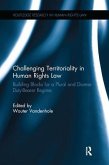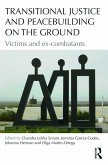"Teresa Degenhardt's analysis of how penal discourses animate post-Cold War military interventions represents a persuasive and original theoretical advance in the study of war, punishment and governance. Her case studies of Kosovo, Iraq and Libya reveal the operation of diverse modalities of punishment to extend the ambit of international liberal governance. It is a 'must read' for anyone interested in the war and crime nexus."
Ruth Jamieson, Honorary lecturer in Criminology at Queen's University Belfast
"In this magistral new book, Degenhardt powerfully shows how, as Beccaria had constituted the modern liberal State around the power to punish, so today the global Western State is relying on the power to punish for the construction of its legitimation. On the basis of a careful analysis of events in Kosovo, Libya and, particularly jarring, Iraq, Degenhardt shows the incredible political strength of a rhetoric of power and punishment, particularly relevant today when the struggle around the contours of the global State in Ukraine is often grounded in the claim to bring war as "punishment"."
Dario Melossi, Alma Mater Professor, University of Bologna, and Distinguished Affiliated Scholar, University of California, Berkeley
"This is a powerful and satisfying book. It examines how military interventions are driven by both the attempt to protect human rights and by the desire to punish perpetrators. Through a careful analysis of the leading post-Cold War cases, Degenhardt reveals the ambiguities of delivering protection and punishment through violence."
Prof. Roberto Belloni, University of Trento, Italy
"Writing on the cusp of fields as wide as criminology, international relations, and war studies, Teresa Degenhardt analyses in remarkable depth the forms of -and justifications for- international military intervention in the age which, we were told, had arrived at the 'end of history'. This is a must read for students and researchers in the above fields, and for all those who are beginning to wonder about the future of the 'end of history'."
Ronnie Lippens, formerly Professor of Criminology at Keele University, UK
Ruth Jamieson, Honorary lecturer in Criminology at Queen's University Belfast
"In this magistral new book, Degenhardt powerfully shows how, as Beccaria had constituted the modern liberal State around the power to punish, so today the global Western State is relying on the power to punish for the construction of its legitimation. On the basis of a careful analysis of events in Kosovo, Libya and, particularly jarring, Iraq, Degenhardt shows the incredible political strength of a rhetoric of power and punishment, particularly relevant today when the struggle around the contours of the global State in Ukraine is often grounded in the claim to bring war as "punishment"."
Dario Melossi, Alma Mater Professor, University of Bologna, and Distinguished Affiliated Scholar, University of California, Berkeley
"This is a powerful and satisfying book. It examines how military interventions are driven by both the attempt to protect human rights and by the desire to punish perpetrators. Through a careful analysis of the leading post-Cold War cases, Degenhardt reveals the ambiguities of delivering protection and punishment through violence."
Prof. Roberto Belloni, University of Trento, Italy
"Writing on the cusp of fields as wide as criminology, international relations, and war studies, Teresa Degenhardt analyses in remarkable depth the forms of -and justifications for- international military intervention in the age which, we were told, had arrived at the 'end of history'. This is a must read for students and researchers in the above fields, and for all those who are beginning to wonder about the future of the 'end of history'."
Ronnie Lippens, formerly Professor of Criminology at Keele University, UK








